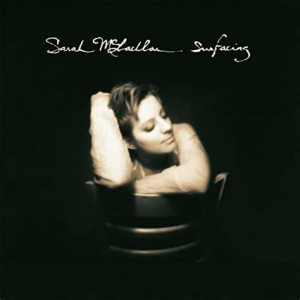
Published on Nov 14, 1997
Who
is that voice?
I waited until this astonishing song came to an end and heard
the DJ say her name. “McLachlan? How would you
spell that?”
Those two questions (in that order) are the first two questions
you’ll ask yourself upon the discovery of Sarah McLachlan
(pronounced ma-KLAU-klan). Soon everyone from a fellow Donna Lewis
webmaster to a guy in my class was telling me I’d end up liking
her, so I eched up some cash and bought an enhanced-CD version of
Surfacing (same cost as the regular).
The first verse of “Building a Mystery” had my eyes rolling. So
much for friendship (and Donna Lewis cross-links) … this is
whitebread radio stuff. To be honest, my biorythms pick up when I
hear this song pop out on my portable AIWA but aren’t these
“alternative” artists supposed to be, well, deep? The second single
“Sweet Surrender” suffers the same condition but it’s not as poppy;
“folk rock”? It’s “boring.” “Witness” sounds exactly like a
conversation between drunk college friends discussing the meaning
of paradise (I don’t know whether to laugh or be disgusted).
But some of these … err … upbeat tracks (for lack of a
better vocabulary) work pretty well. “Adia” is brought to life by
McLachlan’s vaulted vocalizing which is a comfortable blend of air
and country. Her voice is infectuously over-highlighted. Although
she is singing to a woman, it doesn’t sound like the big deal it
should be; it might as well be a guy named Adia (hey, YOU go listen
to Janet Jackson’s “Tonight’s the Night”). “Black and White” talks
about acceptance in a critical chorus; the beat and lyrics resound
of the self-awareness motif.
Many a listener will gravitate towards her ballads like “I Love
You” and “Do What You Have to Do”. The former processes her voice
so the song sounds like a third-perspective listening when in fact
she’s singing in the first. The effect is starkly visual. The
latter utilizes her piano (finally, I must add; it’s track five and
there hasn’t been ANY piano before that) in an intimate voice-piano
arrangement to directly convey emotions; an instant hit.
Two other ballads “Angel” and “Full of Grace” will also stop you
from whatever you’re doing. “Angel”‘s initial theme takes a
sympathetic view towards drug users but it’s much more applicable
than that; it’s a lulluby in the most basic sense, though not for
little kids. “Full of Grace” has the voice, the piano, the English
horn, the violin … the perfect McLachlan song. It’s followed by
the instrumental track “Last Dance” which reminds me of that scene
in
Batteries Not Included (the book) where, at the end of the
day, Frank and Faye put on something on the Wurlitzer and just
dance in the dark cafe.
I’ve heard her piano was top-notch, as it’s proven in “Do What
You Have to Do” but there is more emphasis on guitar in
Surfacing. And that the enhanced CD presentation was one of
the best ever produced (have you ever seen a Pentium lacking
soundcard and CD-ROM? Have you ever
heard of one?). I’ve heard that she was a dark Donna Lewis
and I’ve heard that she can make you cry (almost).
Now people I can trust my Evangelion postcards with have said
these things. I do recommend this album to John Doe, but it didn’t
meet my personal expectations. The good and bad are precariously
balanced. Where it will tip is up to you.